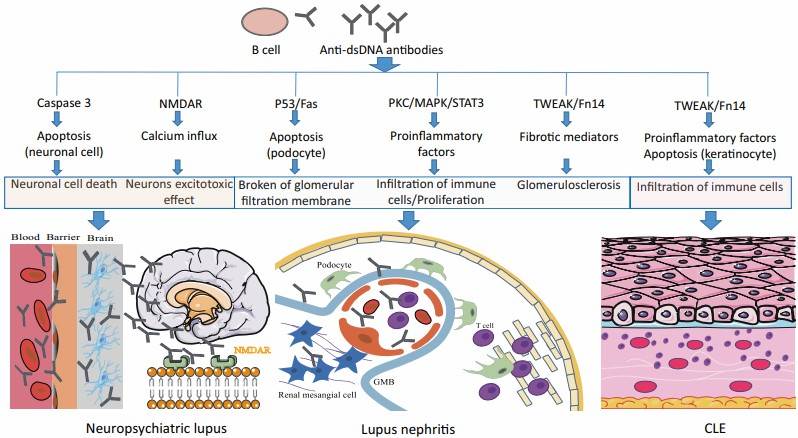NAA Services for Anti-Double-Stranded DNA (dsDNA)
Natural autoantibodies (NAA) are a group of diagnostic markers for autoimmune diseases. With the abundant experience in NAA research, Creative Biolabs has become a world-leading service provider for offering a full range of NAA-related services for global customers based on our powerful and versatile NAA detection platforms. We can offer a series of custom services based on the anti-double-stranded DNA (anti-dsDNA) autoantibodies. Over the past years, we have served hundreds of customers.
Background of Anti-Double-Stranded DNA Autoantibodies
Anti-double-stranded DNA (anti-dsDNA) antibodies are a class of antinuclear antibodies (ANA). They specifically target the genetic material, double-stranded found in the nucleus of a cell. In a healthy person, anti-dsDNA autoantibody is a very important part of the immune system that protects body from infection. However, the autoantibodies are abnormally produced when a person's immune system fails to adequately distinguish between "self" and "non-self", resulting in the occurrence of autoimmune diseases. Hence, anti-dsDNA autoantibody is used as a diagnostic marker for some autoimmune diseases. Anti-dsDNA autoantibodies are most frequently detected by ELISA.
The Role of dsDNA Autoantibodies in NAA Associated Systemic Lupus Erythematosus
SLE is one of the autoimmune disorders that affect a variety of tissue or organs. Anti-dsDNA autoantibodies were first found in the blood of patients with SLE more than 50 years ago. Subsequently, a great deal of evidence has shown that anti-dsDNA autoantibodies exert a critical role in the pathogenesis of SLE, though it seems that this effect occurs via binding to nucleosomes rather than to free dsDNA. Currently, anti-dsDNA autoantibodies detection has been used in the diagnosis of SLE because of its specificity for the disease with studies quoting nearly 100%.
 Fig.1 The pathogenic mechanism of anti-dsDNA antibodies in SLE.1
Fig.1 The pathogenic mechanism of anti-dsDNA antibodies in SLE.1
The Role of dsDNA Autoantibodies in Rheumatic Diseases
Patients with rheumatoid arthritis can produce anti-dsDNA autoantibodies, but they are usually associated with disease treatment. Anti-TNFα biotherapies can generally induce the production of anti-dsDNA autoantibodies. They are usually low avidity and are only detectable transiently after treatment. Besides, the presence of anti-dsDNA autoantibodies is rarely seen in other rheumatic conditions and can induce a lupus-like syndrome in some cases.
The Role of dsDNA Autoantibodies in Malaria
Malaria is among the most life-threatening and widespread mosquito-borne infectious diseases in the world, causing 250−300 million cases and approximately 2 million deaths each year. A study has shown that malaria can be regarded as the possible cause of anti-immune disease. And the expression percentage of anti-dsDNA autoantibodies is statistically significant between patients with malaria and the healthy control group.
What We Can Do about NAA?
The best scientists in Creative Biolabs are enriched in the field of NAA research. Equipped with an innovative technology platform and a professional scientist staff, we are confident to offer comprehensive and high-quality services related to NAA, including but not limited to: NAA detection, profiling, epitope mapping, etc. We also offer custom service to meet customers’ special purpose of NAA projects.
Features of Our Services
- Management team with extensive experience in NAA tests
- Effective test approaches
- Rapid and accurate results
- An accomplished scientific advisory board comprised of prominent academic and industry leaders
- Best after-sale service
If you are interested in our services, please feel free to contact us for more information and a detailed quotation.
Reference:
- Wang, Yaqi, et al. "The therapeutic strategies for SLE by targeting Anti-dsDNA antibodies." Clinical reviews in allergy & immunology 63.2 (2022): 152-165.
Related Services:
- NAA Services for Anti-Nuclear Antibody (ANA)
- NAA Services for Anti-Smith
- NAA Services for Anti-Ribonucleoprotein (RNP)
- NAA Services for Anti-Ro Autoantibodies
- NAA Services for Anti-La Autoantibodies
- NAA Services for Rheumatoid Factor (RF)
- NAA Services for Anti-C3
- NAA Services for Anti-C4
- NAA Services for Anti-C1q

